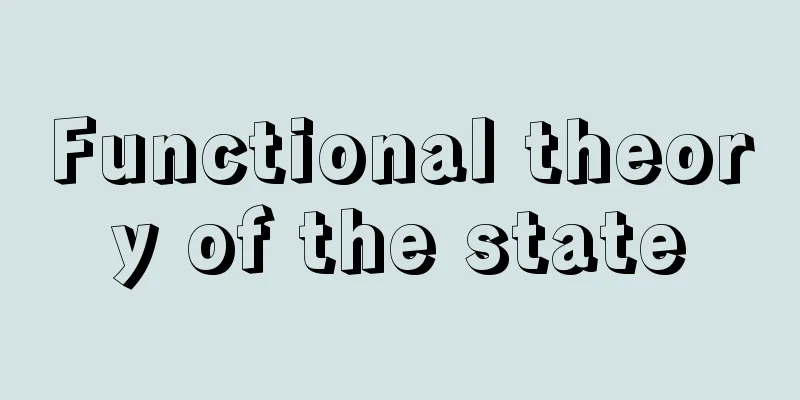Functional theory of the state

|
A democratic view of the state that opposes the view of the state held by Germany and Japan before World War II, which regarded the state as supreme and demanded absolute obedience to it, or which regarded the state as sacred as a community that realizes a certain national mission, and which asserts that the value of a state should be evaluated based on the extent to which the state is able to guarantee and realize the freedom and happiness of individuals, in other words, on the superiority or inferiority of the state's functions (actions and activities). This theory of the state was born out of reflection on the fact that World War I was a struggle between powerful nations in which national interests were given top priority, and out of concern about the political situation at the time, in which efforts to strengthen state power continued despite such a tragic experience.The so-called pluralistic theory of the state, advocated by political and sociological scientists such as Cole and Laski in the UK and McIver in the US, can be said to be a representative theory of functional state theory. Modern states, which emerged after the civil revolutions of the 17th and 18th centuries, declared that they would enact common laws and guarantee freedom and stability in life to all their members, and claimed to have the highest power (sovereignty) to realize this goal. Moreover, because the sovereignty of this state was said to have been established based on the consent and contract of the people, the modern state could easily become synonymous with a democratic state, and because the existence of a state was determined by whether it could guarantee the rights and freedoms of its people and the stability of their lives, and because it was thought that bad government could be changed, in this sense the view of the state at the time of the establishment of the modern state could be said to have been a functional theory of the state. However, in the course of modern history, each nation began to walk a dangerous path, even going so far as to wage imperialist wars in order to secure their own prosperity and security, which accentuated the tendency to prioritize national independence over individual freedom. This tendency also appeared in advanced democracies such as Britain around the time of World War I, and Bozenquit and others introduced Hegelian philosophy, which advocates the superiority of the state over the individual, into state theory. In response, pluralistic state proponents denied the unconditional superiority of the state, arguing that the state was established by people who formed a community to ensure life, freedom, and security, and that in that sense the state is merely a partial society, and that the sovereignty and supreme power given to the state should be exercised in accordance with the purpose for which people established the state. They also argued that the state cannot be run only by a small governing group (government), but can only achieve the purpose of social communal life through cooperation with various partial societies (schools, churches, clubs, companies, labor unions, etc.) that exist within the state. In this way, the functional state theory can be defined as a theory of the state that has inherited the idea of liberal democracy since the establishment of modern states. [Hiroshi Tanaka] "The Outline of Political Science, Vol. 1 and 2, by H. J. Laski, translated by Meizo Hidaka and Eiichi Yokogoshi (1952, Hosei University Press)" ▽ "The State and the Individual, by Hiroshi Tanaka (1990, Iwanami Shoten)" [Reference item] |Source: Shogakukan Encyclopedia Nipponica About Encyclopedia Nipponica Information | Legend |
|
国家を最高至上のものとして国家への絶対服従を要求したり、あるいは国家をある民族的使命を実現する共同体として神聖視したりする第二次世界大戦前のドイツや日本の国家観に反対し、国家の価値は、国家が個人の自由や幸福をどれほど保障し実現しえているかどうか、つまり国家の機能(作用・働き)の優劣において評価すべきであると主張する民主主義的な国家観。 このような国家論は、第一次大戦が国家利益を最優先させた強国間の闘争であったことへの反省、またそうした悲惨な経験を味わったにもかかわらず、その後も依然として国家権力の強化が図られていた当時の政治状況に対する危惧(きぐ)から生まれたもので、イギリスのコールやラスキ、アメリカのマッキーバーなどの政治・社会学者たちが唱えたいわゆる多元的国家論が機能的国家論の代表的理論といえる。 17、18世紀の市民革命後に登場した近代国家は、国内的には、共通の法律を制定して成員全体に自由と生活の安定を保障することを宣言し、その目的を実現するために最高権力(主権)をもつことを主張した。しかも、この国家のもつ主権は、国民の同意・契約に基づいて設立されたものであるとされたから、近代国家はそのまま民主国家の代名詞となりえたし、また国家の存立は、国民の権利・自由や生活の安定を保障できるかどうかによって定まり、悪政は変更してもよいと考えられていたから、この意味では近代国家成立期の国家観は、そもそも機能的国家論であったともいえる。 しかし、その後の近代史の進展のなかで、各国家は、自国の繁栄と安全を図るためには帝国主義戦争をも辞さないという危険な道を歩み始め、そのことが個人の自由よりも国家の独立を優先させる傾向を顕著なものにした。こうした傾向は、第一次大戦前後の時期にイギリスのような先進民主主義国にも現れ、ボーズンキットらによって国家の個人に対する優位を説くヘーゲル哲学が国家理論のなかに導入された。 これに対し、多元的国家論者たちは、国家は、共同社会を形成していた人々が、生命・自由・安全の確保のために設けたものであり、その意味で、国家は部分社会にすぎず、国家に与えられた主権や最高権力は、人々が国家を設立した目的に従って行使されるべきであるとして、国家の主張する無条件的優位性を否定した。また、彼らは、国家は、一部の統治集団(政府)によってのみ運営されるものではなく、国家内部に存在するさまざまな部分社会(学校・教会・クラブ・企業・労働組合など)との協力関係によって初めてその社会的共同生活の目的を達成できると説いた。このようにみるとき、機能的国家論は、近代国家成立期以来のリベラル・デモクラシーの考え方を現代において受け継いだ国家論であると定義づけることができよう。 [田中 浩] 『H・J・ラスキ著、日高明三・横越英一訳『政治学大綱』上下(1952・法政大学出版局)』▽『田中浩著『国家と個人』(1990・岩波書店)』 [参照項目] |出典 小学館 日本大百科全書(ニッポニカ)日本大百科全書(ニッポニカ)について 情報 | 凡例 |
<<: Functional residual capacity
Recommend
justification
…According to Paul’s Epistle to the Romans, chapt...
Slide rule
A calculating device designed to make it easy to ...
Intelligence - Intellect
In a broad sense, intellect refers to the human c...
Chronicles of Emperor Uda
This is the diary of Emperor Uda during his reign....
Cartil - Cartil
…The Sassanid Empire was originally devoted to th...
Hypersensitivity
...Gold sensitization is usually used in combinat...
Gekkaika
The first full-length novel of the late Qing and R...
Iris pallida (English spelling) Irispallida
…[Hiroshi Aramata]. … From [Iris] …[Tetsuichi Yah...
Weather forecast - Tenkiyoho (English) weather forecast
To predict and announce the weather conditions in...
Spring Colors of Tatsumi Garden
A human interest story. Four stories, 12 volumes. ...
Sango
...The Binga people, a pygmy tribe originally inh...
Amphitheater - Enkeigekijo
A theater with spectator seats arranged in a circ...
Variables - Transformation
A letter that represents a quantity that can vary...
Visiting kimono - Homongi
A type of long kimono for women, used as semi-for...
Kyushu dialect - Kyūshū ho-gen
A dialect used in the Kyushu region, specifically ...







![Hakuta [town] - Hakuta](/upload/images/67cc81d6bd159.webp)

